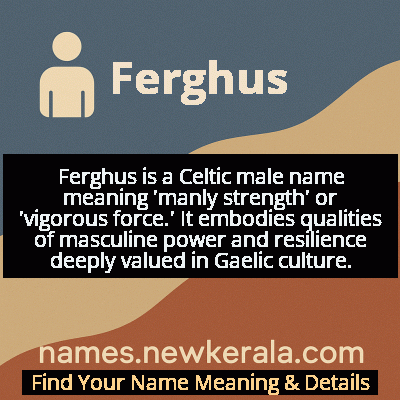Ferghus Name Meaning & Details
Origin, Popularity, Numerology Analysis & Name Meaning of Ferghus
Discover the origin, meaning, and cultural significance of the name FERGHUS. Delve into its historical roots and explore the lasting impact it has had on communities and traditions.
Name
Ferghus
Gender
Male
Origin
Celtic
Lucky Number
3
Meaning of the Name - Ferghus
Ferghus is a Celtic male name meaning 'manly strength' or 'vigorous force.' It embodies qualities of masculine power and resilience deeply valued in Gaelic culture.
Ferghus - Complete Numerology Analysis
Your Numerology Number
Based on Pythagorean Numerology System
Ruling Planet
Jupiter
Positive Nature
Optimistic, inspirational, and creative.
Negative Traits
Scattered, exaggerating.
Lucky Colours
Yellow, gold, purple.
Lucky Days
Thursday.
Lucky Stones
Yellow sapphire.
Harmony Numbers
1, 2, 9.
Best Suited Professions
Arts, writing, communication.
What People Like About You
Creativity, optimism.
Famous People Named Ferghus
Ferghus mac Róich
Ulster Cycle Hero
Legendary warrior of Ulster, former king and champion known for his immense strength and tragic love story with Ness
Saint Ferghus
Christian Missionary
One of the earliest Irish saints who helped spread Christianity in Scotland, founding churches in Perthshire
Ferghus Mór mac Eirc
King of Dál Riata
Semi-legendary king who established the Gaelic kingdom of Dál Riata in Scotland, uniting Irish and Scottish Gaels
Fergus of Galloway
Lord of Galloway
Powerful Gaelic-Norse ruler who maintained Galloway's independence while navigating relationships with Scottish and English monarchs
Name Variations & International Equivalents
Click on blue names to explore their detailed meanings. Gray names with will be available soon.
Cultural & Historical Significance
Beyond mythology, the name appears frequently in early Christian contexts, with several saints bearing the name Ferghus, particularly in Scotland where Irish missionaries established churches and monasteries. The name's persistence through centuries reflects its deep roots in Gaelic identity, representing both pagan warrior ideals and Christian devotion. In Scottish history, the name became particularly associated with the Lords of Galloway, powerful rulers who maintained Gaelic traditions despite Norman and English influences. This dual heritage—mythological and historical—makes Ferghus a name that encapsulates the enduring spirit of Celtic civilization.
Extended Personality Analysis
Individuals named Ferghus are typically perceived as possessing strong, dependable personalities with a natural leadership quality. They often exhibit physical and mental fortitude, approaching challenges with determination and resilience. Their 'manly' character manifests not as aggression but as protective strength—they're often the pillars of their communities or families, offering stability and support during difficult times. There's an inherent nobility to their demeanor, combined with practical wisdom that makes others seek their counsel.
Despite their strength, Ferghus personalities often possess surprising emotional depth and sensitivity. Like their mythological namesake, they may have a romantic or artistic side that balances their powerful exterior. They tend to be fiercely loyal to those they care about, sometimes to a fault, and can be quite traditional in their values. Their strength is typically tempered with compassion, making them both respected and beloved figures in their social circles. The combination of outer strength and inner sensitivity creates a compelling personality that commands respect while maintaining genuine human connection.
Modern Usage & Popularity
In contemporary times, Ferghus remains a distinctive choice that honors Celtic heritage while standing out from more common names. While not among the most popular names in Ireland or Scotland today, it maintains a steady presence, particularly among families seeking to preserve Gaelic traditions. The name has seen a modest revival in recent decades as part of the broader Celtic cultural renaissance, appealing to parents who appreciate its historical depth and strong, masculine qualities. In North America and other diaspora communities, Ferghus is occasionally chosen by families of Irish or Scottish descent as a way to connect with their ancestral roots while selecting a name that's both traditional and uncommon.
Symbolic & Spiritual Meanings
Symbolically, Ferghus represents the archetype of the 'strong protector'—the individual who stands as a bastion of stability and security for their community. The name evokes images of ancient standing stones and oak trees: enduring, rooted, and weather-resistant. It symbolizes not just physical strength but moral fortitude—the courage to stand by one's principles and protect what matters most. In Celtic symbolism, the name connects to warrior ideals of honor, loyalty, and resilience against adversity.
Metaphorically, Ferghus embodies the concept of 'strength through vulnerability'—the mythological Ferghus was both a mighty warrior and a tragic romantic figure, suggesting that true strength includes emotional depth and the capacity for love. The name also represents cultural continuity, serving as a living link to ancient Gaelic traditions and values in the modern world. It symbolizes the persistence of Celtic identity through centuries of change and challenge.

